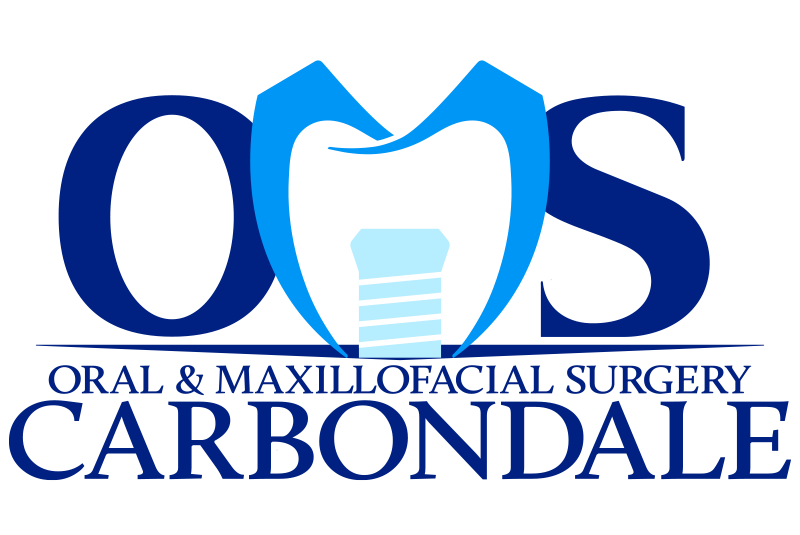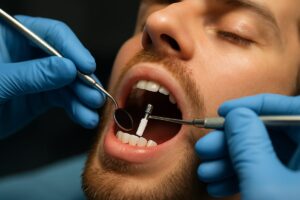Knowing the common signs can help you get care before a small problem becomes an emergency. This guide explains the main symptoms of wisdom teeth growing Marion, IL residents report, how to tell if teeth are impacted, when symptoms need urgent care, and simple steps you can take while you wait for evaluation. It’s written for teens and adults near Marion, IL who want clear, practical advice.
Common symptoms of wisdom teeth growing
Pain at the back of the mouth
A dull ache or sharp pain behind the last molars is the most common early sign. Pain may come and go or stay steady, and it can worsen when chewing or opening your mouth.
Swelling, redness, or gum tenderness
Gums around a emerging wisdom tooth may look red or feel tender. You might notice swollen gum tissue or a small flap of gum covering the tooth.
Jaw stiffness or trouble opening your mouth
Stiffness or limited mouth opening (trismus) can occur when the tooth pushes against surrounding tissues or if nearby muscles become irritated.
Bad taste, bad breath, or pus near the back teeth
An unpleasant taste or chronic bad breath can mean food and bacteria are trapped around a partially erupted tooth. Pus or a foul drainage is a sign of infection.
Headache, earache, or sinus pressure
Pain can radiate. Some people feel headaches, ear pain, or a sense of pressure in the sinuses when wisdom teeth are pressing on nearby structures.
How symptoms differ when wisdom teeth are impacted
Impacted wisdom teeth are blocked by bone or gum tissue and can’t come in fully. Impacted teeth often cause:
- Worse, persistent pain that may spread to the jaw and ear
- Repeated infections or swelling that returns after short relief
- Difficulty sleeping or swallowing when swelling increases
- Signs that the tooth is trapped under gum or bone on exam or imaging
Typical timeline: when to expect wisdom teeth symptoms
Wisdom teeth usually appear between ages 16 and 25. Symptoms can start suddenly or develop over months. Teen years and early 20s are the most common times to watch for pain, swelling, or changes in bite. Some people never have symptoms until a tooth becomes infected or impacted.
When symptoms become urgent — warning signs to act on
Get immediate care if you have:
- High fever with mouth pain or swelling
- Rapidly spreading facial swelling or red streaks
- Difficulty breathing or swallowing
- Severe, uncontrolled pain not relieved by OTC meds
- Fever with worsening pus or persistent drainage
How we diagnose wisdom tooth issues near Marion, IL
We start with a clinical exam to check the gum, tooth position, bite, and signs of infection. For most cases a panoramic X-ray shows tooth position and nearby structures. For complex or unclear cases we use CONE BEAM CT (CBCT) to see detailed 3D anatomy and check for impaction, proximity to nerves, or signs of bone infection. Imaging helps confirm the symptoms of wisdom teeth growing and guides safe treatment planning.
At-home care and short-term relief for symptoms of wisdom teeth growing
- Use gentle saltwater rinses (1/2 teaspoon salt in 8 oz warm water) several times daily.
- Apply a cold compress on the cheek for 10–15 minutes to reduce swelling.
- Stick to soft foods and avoid chewing on the painful side.
- Over-the-counter pain relievers (acetaminophen or ibuprofen) can help; follow label directions.
- Avoid placing aspirin directly on the gum or using unproven home remedies that can damage tissue.
If pain or infection doesn’t improve within 48–72 hours, or if you have worsening swelling or fever, seek professional care.
What to expect from treatment options
Treatment depends on the tooth’s position and infection level. Options include:
- Simple extraction for fully erupted teeth that are easy to remove.
- Surgical extraction for impacted or deeply seated teeth; this may include bone removal and sutures.
- Antibiotics for active infections before or after extraction when needed.
- Advanced techniques like PIEZOSURGERY® or PRF (platelet-rich fibrin) in complex cases to reduce trauma and speed healing.
Recovery typically involves a few days of swelling and easing pain, with most people returning to normal activities in about a week. We do thorough planning; we do not perform same-day consult-to-surgery. When appropriate and planned, we commonly offer same-day tooth extraction into implant post placement.
Marion, IL experts — why choose our oral surgery team
Our office is near Marion, IL (Carbondale, about 15 minutes away). We prioritize careful case review because your long-term health matters — no same-day consult-to-surgery. We offer same-day extraction-to-implant placement when it is safe and planned in advance. Patients have full-time access with 24-hour personal phone collaboration. We work closely with your trusted local GP or dentist when placing implant restorations. We serve Marion and nearby counties including Jackson, Williamson, Johnson, Union, Franklin, Perry, and Randolph.
Advanced tools we use to improve outcomes
- CBCT scanner for 3D imaging
- X-Guide 3D navigation for precise implant placement
- Intraoral scanner to plan restorations
- PIEZOSURGERY® to reduce trauma
- PerioLase™ and Accuvein for soft-tissue care and vein location
- Osstell ISQ to monitor implant stability
- PRF (platelet-rich fibrin) to support healing
Other oral surgery services offered
- Endosteal and zygomatic dental implants
- Bone grafting and sinus lifts
- Implant restorations in collaboration with your GP
- Complex extractions and management of dental infections
When to call us — next steps for people near Marion, IL
If you have worrying signs, bring any recent X-rays, a list of medicines, and a summary of symptoms to your consult. An exam and imaging can confirm the cause of your pain and show the best treatment plan. To request an appointment for concerns about the symptoms of wisdom teeth growing Marion, IL, call our office or request a consult online. We’ll review your case carefully and explain next steps.





